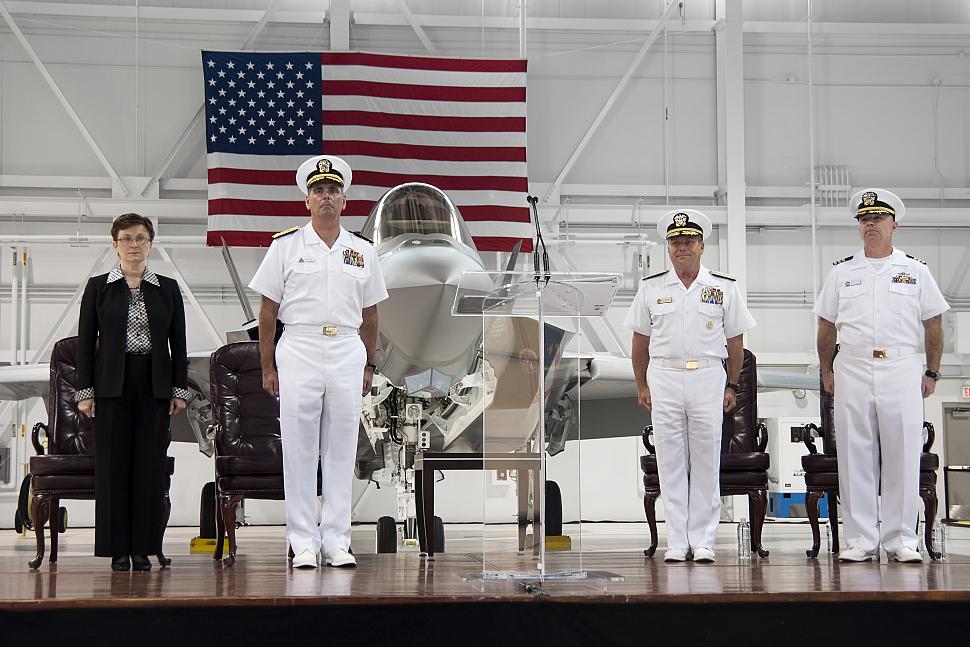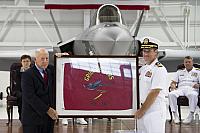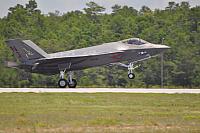Fighter Jet News
F-35 Lightning II News
Navy rolls out F-35C
October 7, 2013 (by
Asif Shamim) -
The Navy's first F-35C Lightning II carrier variant aircraft squadron, the "Grim Reapers" of Strike Fighter Squadron 101, hosted a roll-out ceremony for their new aircraft at the squadron's home October 1st.

The rollout ceremony commemorated the long, storied history of the "Grim Reapers" and the establishment of VFA-101 as the Navy's first F-35C Fleet Replacement Squadron.
Retired and active duty service members from the Navy, Marine Corps, and Air Force attended the ceremony, as well as industry partners from Lockheed Martin, Northrop Grumman, Pratt and Whitney, and BAE Systems.
Commander, U.S. Fleet Forces Command, Adm. Bill Gortney; Commander, Naval Air Forces, Vice Adm. David H. Buss; and Lockheed Martin Executive Vice President and General Manager, F-35 Lightning II Program, Lorraine M. Martin provided remarks about the Navy's new aircraft and the legacy of the "Grim Reapers."
Gortney recognized the significance of the rollout ceremony and spoke about the future importance of the fifth-generation fighter in enhancing the flexibility, power projection, and strike capabilities of future carrier air wings and joint task forces.
"Today, we formally recognize the next generation of Naval Aviation - the F-35C," said Gortney. "The most important revolution is fusing these weapons systems with the rest of the weapon system. Our cruisers, destroyers, P-8s, Tritons, and operational and tactical headquarters - the decision makers."
Buss spoke about how the Navy's stealth fighter will ensure that future carrier air wings are capable of fulfilling two important missions - assure access and project power.
"Our Navy needs aircraft capable of overcoming a variety of threats - surface-to-air missiles, air-to-air missiles, and tactical aircraft," said Buss. "The F-35C brings stealth capability to the ultimate sea base - the flight deck of a nuclear-powered aircraft carrier - for the first time in our history."
"The F-35C mixed with the capabilities of the F/A-18E/F Super Hornet, EA-18G Growler, E-2D Hawkeye, MH-60R/S helicopters will provide carrier-based Naval Aviation the ability to fulfill these requirements well into the future," said Buss, regarding the Navy's ability to combat future threats.
Martin spoke about the unique design and capabilities of the F-35C, which complements the capabilities of the F/A-18E/F Super Hornet, the Navy's current premier strike fighter.
"With its rugged structure to withstand the tough environments aboard our carriers, advanced avionics, high resolution sensors, fused targeting and combat information networks linked directly into the grid, the F-35C will become a critical, lethal node in the strike group network," said Martin.
Vice Commander, 33rd Fighter Wing, Capt. Paul Haas provided a brief overview of the history of the "Grim Reapers," a nickname that has served three difference squadrons - Fighter Squadron (VF) 10, VF-101 and now Strike Fighter Squadron (VFA) 101 - since June 1942.
VFA-101 Sailors and officers then paid tribute to the "Grim Reapers" legacy by honoring the first two commanding officers of the original "Grim Reapers" of VF-10, Vice Adm. James H. Flatley, Jr., and Capt. William R. Kane, who both received the Navy Cross for their service during World War II. Flatley was represented by his son, retired Rear Adm. James H. Flatley, III, and Kane was represented by his daughter, Chris Kane Andrews.
Throughout the years, the "Grim Reapers" have fought in various aircraft, including the F4F Wildcat, the FG1-D Corsair, the F-4 Phantom, the F-14 Tomcat and currently the F-35C. The "Grim Reapers" flew combat missions in the Battle of Guadalcanal and the Korean War and at various times since World War II, served as trainers for future Naval Aviators joining the fleet.
"The legacy of the Grim Reapers is one, quite literally, for the history books. Not only for its past legacy, but also of the expectations of the future," said Martin. "With the F-35C under this squadrons command, VFA-101 will once again have the opportunity to fly their flag and leave their mark on aviation history."
"Today's grim reapers are picking up where VF-101 left off almost a decade ago, laying a new foundation for training our nation's premier carrier-based strike fighter aviators and maintainers," said Haas.
VFA-101 received the Navy's first F-35C June 22, 2013, from Lockheed Martin, becoming the Navy's first F-35C squadron, and completed its first check flight in the squadron's new aircraft Aug. 14, a milestone that reinforced the Navy-industry partnership and represented a step forward in the development of the Navy's next generation fighter. As the F-35C Fleet Replacement Squadron, VFA-101 trains Navy aircrew and maintenance personnel to fly and repair the F-35C.

Lorraine Martin, Lockheed Martin Executive Vice President and General Manager of the F-35 Program; Navy Vice Adm. David Buss, Commander, Naval Air Forces; Navy Adm. William Gortney, Commander, U.S. Fleet Forces Command and Navy Cmdr. Steven Orren were keynote speakers at the Navy's F-35C rollout ceremony on October 1st, 2013 at the Navy's VFA-101 hangar, 33rd FW, Eglin AFB. [Lockheed Martin photo]
Retired and active duty service members from the Navy, Marine Corps, and Air Force attended the ceremony, as well as industry partners from Lockheed Martin, Northrop Grumman, Pratt and Whitney, and BAE Systems.
Commander, U.S. Fleet Forces Command, Adm. Bill Gortney; Commander, Naval Air Forces, Vice Adm. David H. Buss; and Lockheed Martin Executive Vice President and General Manager, F-35 Lightning II Program, Lorraine M. Martin provided remarks about the Navy's new aircraft and the legacy of the "Grim Reapers."
Gortney recognized the significance of the rollout ceremony and spoke about the future importance of the fifth-generation fighter in enhancing the flexibility, power projection, and strike capabilities of future carrier air wings and joint task forces.
"Today, we formally recognize the next generation of Naval Aviation - the F-35C," said Gortney. "The most important revolution is fusing these weapons systems with the rest of the weapon system. Our cruisers, destroyers, P-8s, Tritons, and operational and tactical headquarters - the decision makers."
Buss spoke about how the Navy's stealth fighter will ensure that future carrier air wings are capable of fulfilling two important missions - assure access and project power.
"Our Navy needs aircraft capable of overcoming a variety of threats - surface-to-air missiles, air-to-air missiles, and tactical aircraft," said Buss. "The F-35C brings stealth capability to the ultimate sea base - the flight deck of a nuclear-powered aircraft carrier - for the first time in our history."
"The F-35C mixed with the capabilities of the F/A-18E/F Super Hornet, EA-18G Growler, E-2D Hawkeye, MH-60R/S helicopters will provide carrier-based Naval Aviation the ability to fulfill these requirements well into the future," said Buss, regarding the Navy's ability to combat future threats.
Martin spoke about the unique design and capabilities of the F-35C, which complements the capabilities of the F/A-18E/F Super Hornet, the Navy's current premier strike fighter.
"With its rugged structure to withstand the tough environments aboard our carriers, advanced avionics, high resolution sensors, fused targeting and combat information networks linked directly into the grid, the F-35C will become a critical, lethal node in the strike group network," said Martin.
Vice Commander, 33rd Fighter Wing, Capt. Paul Haas provided a brief overview of the history of the "Grim Reapers," a nickname that has served three difference squadrons - Fighter Squadron (VF) 10, VF-101 and now Strike Fighter Squadron (VFA) 101 - since June 1942.
VFA-101 Sailors and officers then paid tribute to the "Grim Reapers" legacy by honoring the first two commanding officers of the original "Grim Reapers" of VF-10, Vice Adm. James H. Flatley, Jr., and Capt. William R. Kane, who both received the Navy Cross for their service during World War II. Flatley was represented by his son, retired Rear Adm. James H. Flatley, III, and Kane was represented by his daughter, Chris Kane Andrews.
Throughout the years, the "Grim Reapers" have fought in various aircraft, including the F4F Wildcat, the FG1-D Corsair, the F-4 Phantom, the F-14 Tomcat and currently the F-35C. The "Grim Reapers" flew combat missions in the Battle of Guadalcanal and the Korean War and at various times since World War II, served as trainers for future Naval Aviators joining the fleet.
"The legacy of the Grim Reapers is one, quite literally, for the history books. Not only for its past legacy, but also of the expectations of the future," said Martin. "With the F-35C under this squadrons command, VFA-101 will once again have the opportunity to fly their flag and leave their mark on aviation history."
"Today's grim reapers are picking up where VF-101 left off almost a decade ago, laying a new foundation for training our nation's premier carrier-based strike fighter aviators and maintainers," said Haas.
VFA-101 received the Navy's first F-35C June 22, 2013, from Lockheed Martin, becoming the Navy's first F-35C squadron, and completed its first check flight in the squadron's new aircraft Aug. 14, a milestone that reinforced the Navy-industry partnership and represented a step forward in the development of the Navy's next generation fighter. As the F-35C Fleet Replacement Squadron, VFA-101 trains Navy aircrew and maintenance personnel to fly and repair the F-35C.
Courtesy of Naval Air Forces Public Affairs
Related articles:
Forum discussion:
Tags
- Navy launches first local F-35C sortie ( 2013-08-15)
- Navy Receives First F-35C Lightning II ( 2013-06-22)
- F-35 Lightning II news archive
Forum discussion:
- VFA-101 Activated at Eglin ( 24 replies)
Tags
Additional images:

The U.S. Navy and the 33rd Fighter Wing officially reconstituted the highly decorated VFA-101 Grim Reapers Squadron during an October 1st, 2013 ceremony at Eglin AFB. [Lockheed Martin photo]


